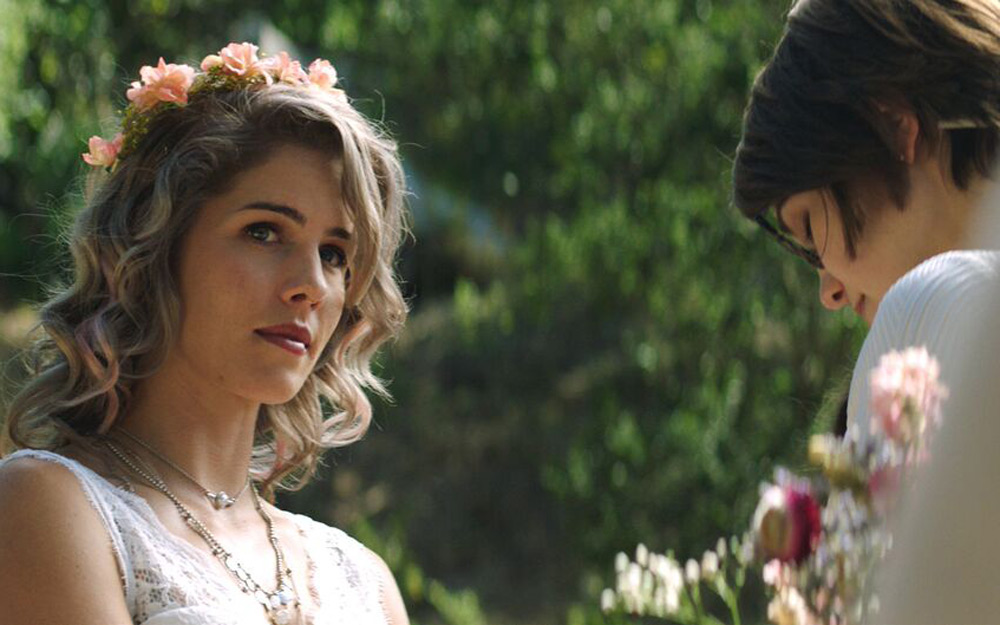As “Funny Story” begins, you find yourself across a table from Walter (Matthew Glave), an actor you quickly come to discover doesn’t have a way with words. It’s a classic scene, framed exactly as it always is, as Walter attempts to break up with his girlfriend Lucy (Daisye Tutor) in a fancy restaurant, with you sitting in the place of her as he looks dead into the camera to say, “If I were going to use one word to describe you, I think it would be acute.” But it starts to go wildly off the rails as Walter ironically starts fumbling around to explain what he means by “acute,” eventually defining it as narrow self-interest, an observation that isn’t entirely wrong as you learn when the camera finally mercifully turns to Lucy taking selfies of herself, paying little attention to what Walter is saying. Yet it still is hardly the right word choice for what he’s trying to say, just like when he describes himself as “obtuse,” an accurate descriptor that loses all meaning when it becomes self-congratulatory for being adult enough to say it.
Only someone with an actually sharp command of language could get this exchange as exactly right as co-writers Michael J. Gallagher and Steve Greene do, and the shrewd casting of Glave, who cleverly subverts his gift for playing self-assured creeps in “The Wedding Singer” and more recently, “Better Things” (so much so show creator Pamela Adlon has used his instant smarm to actually show a distant father being distant, dispatching him only in small increments), set the tone for “Funny Story,” in which the gap between what people say and their intentions couldn’t be greater. Gallagher and Greene find that there is a compelling story in the middle, as well as considerable comic opportunities, especially after Walter’s mangled breakup attempt get even more warped when greeted with Lucy’s news that she’s pregnant. You might think Walter would want to be alone for a while after this, but when his adult daughter Nic (Jana Winternitz) calls to cancel plans to meet up in San Diego, preferring to stay with friends in Big Sur for the weekend, Walter jumps at the chance to invite himself up, with plans already to attend a fan convention in San Francisco for his popular ‘90s fantasy show “Youngblood” just after.
Walter doesn’t take the eight-hour trip up the coast all alone, however, with Nic’s reluctant acceptance including a ride for her former college classmate Kim (Emily Bett Rickards), who also finds herself in San Diego for her mother’s funeral, though they’d been estranged for some time. With other guests asking who she is at the wake, Kim is at her lowest when she gets into Walter’s Porche SUV, just waiting for the opportunity to bring up what she knows about his own tortured relationship with Nic, which fell apart after he left her mother for the much younger Lucy, though her plans for a one-sided conversation are upended by his sincere expressions of regret as they spend the night together at a B & B in Solvang for a pit stop. While the two bond over their many missteps, it would seem that they’ve each found someone who could understand them, but Gallagher and Greene show no desire to give Walter and Kim the happy ending you’d typically see, instead going after something much messier and more interesting as you see how the two are nurturing their worst self-destructive impulses, which are bound to explode once confronted with a surprise that awaits in Big Sur, at least for Walter.
For as emotionally gnarly as “Funny Story” gets, Gallagher shows a steady hand and dare we say, an “acute” understanding of what’s unfolding between Walter and Kim, creating a fascinating dynamic where the tension comes from seeing whether the pair can resist pulling others into their path of destruction or not once they’re surrounded by Kim and Nic’s friends at a coastal retreat. Both Glave and Rickards impressively toe the line between blustery self-regard and the vulnerability it hides as Walter and Kim, showing how each snarky rejoinder they deliver often sting themselves more than their intended target. This idea is embedded into the film aesthetically, shot with sun-soaked elegance by cinematographer Greg Cotten where the shadows linger around the edges of the frame to show the trouble Walter and Kim have with seeing the beauty that is all around them, being held back by the past. Every one of the film’s devilish twists is directly tied to whether or not they can break with past behavior, with Gallagher and Greene sneakily laying the groundwork for one fun turnabout after another and if there were any complaint with “Funny Story” it is with its initial stylistic conceit, using Woody Allen’s famous Windsor Light Condensed typeface and the familiar 1920s jazz accompaniment to bring audiences into a film meant to defy expectations at each turn. With a film as distinctive in tone as “Funny Story,” the comparison is unnecessary and Gallagher has truly captured lightning in a bottle – in all its dangerous and illuminating glory – in putting such wounded, authentic characters onscreen.
“Funny Story” opens on May 24th in Los Angeles at the Laemmle Music Hall and in San Francisco at the 4Star Theaters. A full list of screenings and dates is here. It is also available on iTunes.




